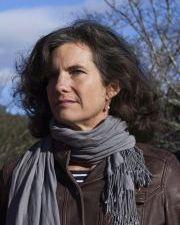The Prizewinner 2022

| Name | Dr. Felicia Keesing |
|---|---|
| Born on | January 24, 1966 |
| Nationality | USA |
| Title | Professor of Biology, Bard College |
Reason for Awarding
Dr. Felicia Keesing is an ecologist who has studied the relationship between the biodiversity of species that comprise a natural ecosystem and the risk that zoonotic pathogens residing in the ecosystem may be transmitted to human society, based on findings of research studies implemented in a variety of fields.
The recent global pandemic of the novel coronavirus (COVID-19) has brought unprecedented chaos to human society, tremendously impacting our lives and the economy. Having experienced this health crisis on a global scale, we have come to realize the necessity of radically reconsidering the ideal state of the relationship between humans and wildlife. However, Dr. Keesing has pointed out since early on that the threats of emerging and re-emerging infectious diseases will rise if species diversity declines in natural ecosystems.
To explore the relationship between biodiversity conservation and the spread of zoonotic pathogens, Dr. Keesing has conducted field studies in African savanna regions and the northeastern United States, including New York State, as well as pursuing experimental research in the laboratory. By continuing these activities over a long period of time, she has clarified the aforementioned relationship, even taking into account ecological mechanisms of interspecific pathogen transmission. She has positively demonstrated that while ecosystems with high species diversity can be a breeding ground of various pathogens, the overall risk of infection transmission to humans and other non-natural host species often decreases in these ecosystems, due to the presence of many species that are resistant to infection with certain pathogens. This is because the growth and spread of these pathogens is inhibited, causing their density to remain low (diluted). In addition, she has shown that when humans enter a natural ecosystem, generally the number of large mammals will decline, leading to an increase in the population density of small mammals (rodents, Carnivora, etc.), and that, since these animals serve as abundant hosts for zoonoses, the rate of zoonotic transmission to humans will increase.
Thus far, Dr. Keesing has consistently insisted that there is no single universal method for defining the scope of biodiversity to be conserved and determining its univocal efficacy. Rather than seeking such a single solution, she believes that researchers should meticulously investigate the complex relationships between multiple factors—such as the infection mechanisms, habitat characteristics, and ecological affinity of pathogens. She holds the opinion that only by doing so can they find a solution based on a new perspective and scientific rigor, in order to answer the question, “Why do we need to conserve biodiversity?” in a manner that is tailored to individual regions.
Meanwhile, she has been vigorously working to promote “open science,” which allows experts and non-experts alike to more easily access scientific papers and data on research findings. Furthermore, together with her colleagues, Dr. Keesing has formed a network to provide education to young researchers, ranging from junior and senior high school students to college undergraduates and graduates. Such interactions between Dr. Keesing and students as well as ordinary citizens are of great social significance.
The series of research results achieved by Dr. Keesing are based on an interdisciplinary approach that includes the fields of ecology, public health, and other disciplines, and the results and her methods are in accord with the purpose of the International Cosmos Prize, which seeks to illuminate the interrelationships among all life forms. These achievements are also extremely meaningful in charting the future course toward realizing “Harmonious Coexistence between Nature and Humankind,” and are expected to provide profound suggestions for the establishment of the “New Normal,” which is required in the post-COVID-19 era.
As stated above, her outstanding accomplishments make Dr. Felicia Keesing truly deserving of being a laureate of the International Cosmos Prize.
Professional Preparation
| 1987 | B.Sc., Stanford University |
| 1997 | Ph.D. in Integrative Biology, University of California at Berkeley |
Appointments
| 1997-2000 | Assistant Professor of Biology, Siena College |
| 2000-2003 | Assistant Professor of Biology, Bard College |
| 2003-2012 | Associate Professor of Biology, Bard College |
| 2012-now | Current Position |
